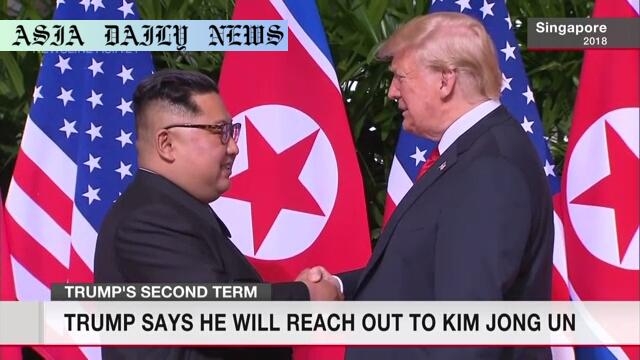Trump’s proactive approach in re-engaging with North Korean leader Kim Jong Un highlights the significance of his diplomatic efforts.
- US President Trump commits to re-establishing communication with Kim Jong Un.
- He emphasizes his previous summits as key achievements in diplomacy.
- Trump’s interactions aim for peace and denuclearization on the Korean Peninsula.

Trump’s Renewed Initiative with North Korea
US President Donald Trump has once again reiterated his determination to reconnect with North Korean leader Kim Jong Un. In a Fox News interview broadcasted on Thursday, Trump described his rapport with Kim as positive, praising him as a “smart guy.” Highlighting their previous interactions, which included three high-profile summits, Trump portrayed these meetings as significant milestones in his presidency and as foundational to his foreign policy approach.
Historical Context of Trump-Kim Meetings
The 2018 summit in Singapore marked a pivotal moment in US-North Korea relations, as it was the first time a sitting US president met with a North Korean leader. The meeting yielded agreements aimed at promoting peace and denuclearization on the Korean Peninsula, although subsequent negotiations struggled to materialize into concrete actions. Trump also met Kim at the Demilitarized Zone (DMZ) in 2019, reinforcing his unique approach to diplomacy with North Korea.
Challenges in Achieving Denuclearization
Despite the initial optimism surrounding these summits, critics argue that the lack of substantive progress in denuclearization highlights the complexities of dealing with North Korea. The country has continued to expand its nuclear arsenal, showcasing missile technology advancements. Nevertheless, Trump sees his established communication with Kim as a strategic advantage and intends to leverage this connection once again. While the specifics of his future outreach remain unclear, the potential for dialogue marks a significant difference in tone from traditional hardline stances.
Trump’s Critique of Conventional US Foreign Policy
Trump has often criticized prior administrations for their approaches to North Korea, asserting that decades of pressure-based policies were ineffective. His willingness to engage personally with Kim reflects his broader belief in direct diplomacy, emphasizing relationship-building over punitive measures. While some consider this approach unorthodox, others argue it opens a door to long-term peace and stability in the region.
Impact on US-North Korea Relations
The ramifications of Trump’s diplomacy efforts with Kim Jong Un remain a subject of debate. Supporters highlight the symbolic importance of these engagements, suggesting that they eased tensions and normalized dialogue between the nations. Conversely, detractors believe that these summits allowed North Korea to gain international recognition without offering significant concessions. Whether Trump’s renewed outreach will yield tangible results or remain symbolic remains to be seen.
The Broader Implications of Renewed Contact
Trump’s pledge to reconnect with Kim reflects a broader theme in modern diplomacy, where direct leader-to-leader communication plays an increasingly important role. The outcomes of such efforts could influence not only US-North Korea relations but also broader geopolitics, including US relations with South Korea and China. Furthermore, the continuation of diplomatic efforts emphasizes the importance of dialogue in addressing global challenges, including nuclear disarmament.
Concluding Thoughts
Trump’s renewed determination to pursue communication with Kim Jong Un is a testament to his belief in diplomacy’s potential to resolve long-standing conflicts. While challenges remain, the willingness to engage demonstrates a commitment to maintaining dialogue in a tumultuous geopolitical climate. Whether this translates into actionable progress or remains symbolic will shape the legacy of US-North Korea relations in years to come.



Commentary
Assessing Trump’s Approach to North Korea
Donald Trump’s assertion that he will reconnect with North Korean leader Kim Jong Un offers an intriguing perspective on his unique approach to diplomacy. Unlike his predecessors, Trump has taken direct leader-to-leader communication to new heights, a method that has drawn both praise and criticism. Proponents argue that personal engagement has the potential to break impasses and foster better mutual understanding. On the other hand, skeptics caution that such overtures may reward authoritarian regimes with undue legitimacy.
The Symbolism of Past Summits
The three summits during Trump’s first term were undoubtedly symbolic milestones in US-North Korea relations. While critics point out their limited tangible outcomes, it is hard to deny the impact these meetings had in reshaping global perceptions. Trump’s ability to build a personal rapport with Kim showcased an alternative route to diplomacy, one focused on building bridges rather than relying solely on traditional tools such as sanctions and international pressure.
Looking Ahead: Opportunities and Challenges
As Trump advocates for renewed contact, the potential impact of his strategy remains uncertain. While direct dialogue could pave the way for breakthroughs, North Korea’s history of stalled negotiations raises concerns. Nevertheless, Trump’s efforts have emphasized the importance of keeping communication channels open, even amid complex geopolitical challenges. Ultimately, whether this approach results in meaningful progress or serves as political posturing will depend on future developments.
Final Thoughts
The prospect of renewed diplomacy with North Korea is an ambitious undertaking, but one fraught with uncertainties. As the dynamics of global politics continue to evolve, it remains to be seen whether Trump’s brand of direct engagement can achieve the elusive goal of denuclearization and peace on the Korean Peninsula. Regardless of opinions on his approach, the emphasis on dialogue underscores the enduring significance of diplomacy in resolving international challenges.